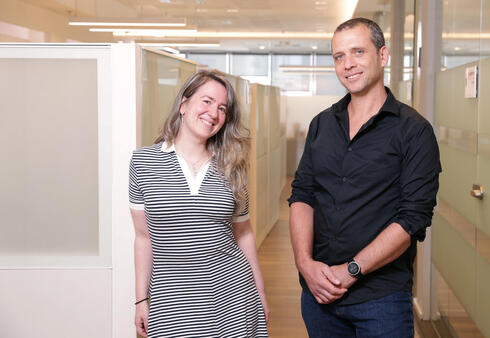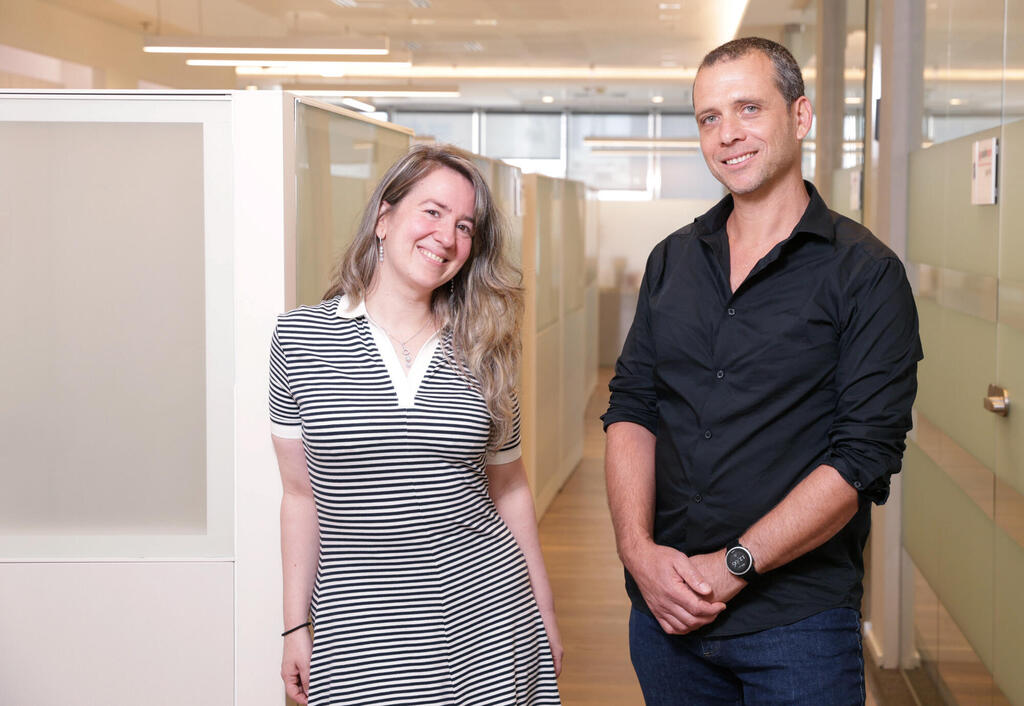
"The only way to achieve success is to focus deeply on one area"
Anat Shakedd from Nexite and Dotan Eshet from Treetoscope spoke at the Growth+ mentoring meeting of Calcalist and Poalim Tech about focusing on what you must do and letting go of what you don't.
Anat Shakedd, CEO of Nexite, and Dotan Eshet, CEO of Treetoscope, recently shared their insights at the Growth+ mentoring meeting organized by Calcalist and Poalim Tech. Their discussion highlighted the importance of focusing on essential tasks and letting go of unnecessary ones to ensure startup success.
The conversation was held as part of the Growth+ project, involving a series of 1:1 meetings between experienced entrepreneurs and early-stage start-up companies, with the goal of providing advice, support, and knowledge on entrepreneurship, creativity, managing start-ups, and building companies for growth.
Anat, tell me about a crisis you encountered at the beginning of your journey and what you learned from it that can help young entrepreneurs.
"When you build a category, you have to do many things to come up with a complete solution. Otherwise, you are constantly dependent on other factors and have no control over your future. The number of different things that need to be done is enormous. At first, there is no choice, and you have to do it, but one of the challenges is to quickly understand what you don't have to do and where you must focus as a small startup. There is a clear limit to how many things you can do simultaneously. On the one hand, it's difficult because there are opportunities everywhere. Part of the goal in the early stages is to ensure you focus. We started by developing chips, tags, and software, hoping a big company would do the rest. However, we quickly discovered that large companies would not move as fast as us. All our control comes from having a complete solution. We started developing it ourselves, which took more time and money than planned, but it was essential to control all the elements of the solution."
Dotan, what is the biggest difficulty you encountered this year?
"The current period is very difficult. Forty percent of the team was in the IDF reserves for a long time; now, 25% of the team is in the reserves, and we are working against tough targets. Fundraising is also not easy now. The business environment is challenging, but our team believes in the goal, is mobilized and committed, so we manage to succeed. When the war broke out on October 7th, I was swimming in the sea at 6:30 am. That evening I boarded a plane to Mexico. A rocket fell 600 meters from my house. I have three employees from Netiv Ha’Asarah who were in their bomb shelters at the time, one of whom was injured. The most important employee on the team, one of the first in the company, has been fighting in Gaza for eight months. These are the struggles."
Anat, what did you advise Dotan?
"We talked a lot about the importance of adapting the product to the market. Until you get there, you have to choose one thing to focus on. It's very easy to hedge risks and do many things to increase the chance of success, but the only way to achieve success is to focus deeply on one area, understand what is needed to develop there, and deal with the difficulties it brings in the early stages when the team is small, especially when part of it is at war."
What did you learn from each other?
Dotan: "I was very impressed by Anat's directness, search for the truth, and knowing where we are going. With Anat, the focus was more territorial, and with us, the focus is more on the product level—how we give up features and what is the core that the customer needs."
Anat: "It's always amazing how the journey of building a company is very similar. Even if it seems from the outside that these are different stages or times, the difficulties and decisions are very similar. We experience very similar things, especially during this time in Israel. It's comforting to know that you are doing something you are passionate about, even though it is challenging, and you are not alone."
Tell us about something interesting you discovered about each other.
Anat: "We both demonstrate on Kaplan Street every week, and the reason we haven't met is because there are so many people there."
Dotan: "I have four children, and Anat has five."
Michal Kissos Hertzog, CEO of Poalim Tech, concluded: “In my conversations with entrepreneurs, we talk a lot about how to build a relatively easy solution so that you can prove that your idea is really necessary. That is, how do I get 90% of the benefit with 10% of the work. Too often entrepreneurs spend too much time developing their idea, before they can prove it is necessary. That is why it is important to build the solution gradually, incrementally. We saw this importance also in the stories of the more mature and experienced entrepreneurs in this project."















